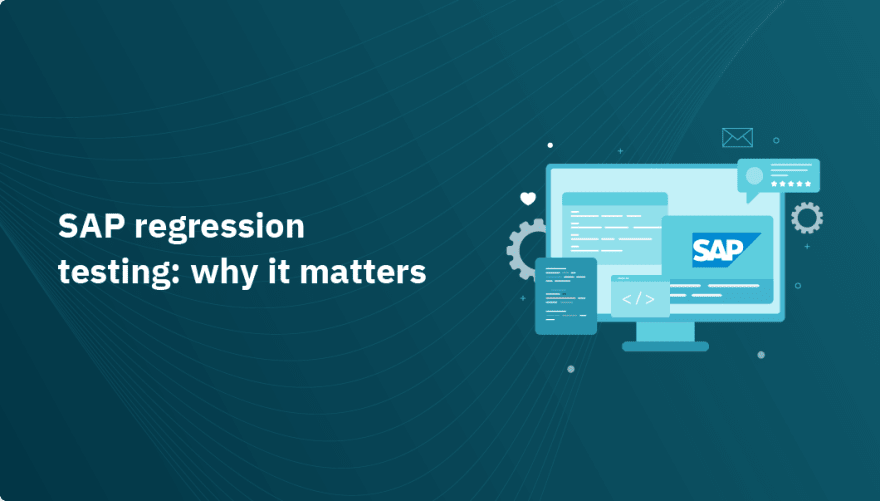
As your organization continues to create customizations, SAP says S/4HANA will bring more frequent SAP updates than ever before. How can businesses optimize the SAP regression testing cycle with all these modifications and updates? This article examines typical issues with SAP regression testing procedures. Additionally, we describe how no-code automation may improve their testing coverage.
What is regression testing in SAP?
Regression testing evaluates the quality of the product after a configuration change, release, or bug fix in the SAP applications. It ensures that previous processes continue to function after the changes. SAP regression testing enhances software quality and prevents failures in production.
Challenges of SAP regression validation
SAP testing is a challenging endeavor. Your regression suite will increase as your SAP landscape changes over time. Companies that do not use test automation should be concerned because manually testing your SAP regression suite could take months to complete. Large SAP regression testing suites are a result of various factors, including:
SAP offers a broad range of corporate capabilities, from finances to human resources.
SAP offers significant yearly updates as well as frequent minor updates.
Testing is necessary to make sure that integrated legacy programs continue to operate as planned.
Regression testing will be more frequent as a result of the required migration to SAP S/4HANA, which will increase the frequency of SAP updates.
Business users cannot use traditional test automation solutions because they are too technical. The goal of test automation is to enable you to run more tests, more frequently, and with less work, but a challenging learning curve and complicated scripts may prevent this from happening.
Another time-consuming task is to maintain regression test cases that have been impacted by changes.
SAP regression testing best practices
With user-friendly, no-code automation solutions, business users can easily create and administer automated scripts, which can cut down maintenance time and boost quality. These automated regression tests can be run on demand, overnight, or over the weekend to free up users to work on higher-value tasks like streamlining processes and fixing defects.
You need data to determine the effectiveness of your automation efforts. You must be able to monitor test runs, test progress, and the defect life cycle. Even better if you can view them on a centralized, simple-to-understand dashboard in real-time.
Regardless of their level of technical experience, all employees can use the no-code testing platform to access test automation. A simple drag-and-drop test recorder that can be used to create automated tests, users can also just carry out their normal workflows while documenting their actions and developing automated tests.
Syncing tests with documentation makes it easier for everyone to stay informed. Modify the test cases, and edit the document (and vice versa).
Use SAP regression testing tools
Enterprises are looking for SAP regression testing tools that not only reduce test execution time but also reduce testing costs. A tool with built-in SAP-specific features is an obvious choice, as it can give a quicker turnaround. Traditional test automation tools cannot solve the purpose since maintenance overheads are involved with them. A lightweight tool that requires minimum coding is what enterprises are looking for.
As per the study, QA teams spend 30 to 50 percent of their time setting up test environments instead of spending it on actual testing. Due to this, approximately 74% of projects get delayed.
Testing teams require a robust test automation framework that can be scaled but also be maintained easily, identify regression scenarios/test cases, and create regression test suites that are required on every release.
Read more about how AI-powered test automation can help customers reduce the costs, effort, and timeliness of their regression testing.
Seamlessly manage these challenges with Opkey
Opkey is the industry’s leading test automation platform for SAP that enables customers to accelerate their testing while keeping pace with their digital transformation initiative. Features like test discovery, pre-built test components for SAP, and risk-based assessment offer an unparalleled SAP regression test automation experience to customers.
Opkey is a no-code test automation platform that enables enterprises using SAP to move from a "test everything" approach to risk-based testing. Real-time change impact analysis engine highlights the most-at-risks objects, enabling QA teams to narrow the test scope down to impacted objects and forms. Since Opkey can identify risk-based objects, it helps QA teams achieve wider test coverage up to 90% while accelerating the test cycles.
Rather than wasting time testing all the objects that aren’t impacted by an update, QA teams can test only the impacted areas, thus reducing significant time and cost.


Top comments (0)